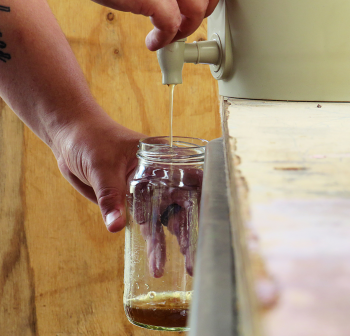As more gardeners seek sustainable and organic methods to nourish their plants, compost tea has emerged as a favourite natural fertiliser. This nutrient-rich liquid is easy to make at home, beneficial for a wide range of plants, and environmentally friendly. Whether you’re an experienced composter or just starting out, compost tea offers a simple yet powerful way to boost soil health and plant vitality.
ALSO SEE: How to graft plants successfully: a step-by-step guide to propagation
What is compost tea?
Compost tea is a liquid extract produced by steeping mature compost in water. The process draws out beneficial microorganisms, nutrients and organic compounds that help support plant growth and improve soil quality. Unlike synthetic fertilisers, compost tea nurtures the soil ecosystem rather than merely feeding plants directly.
Why use compost tea in the garden?
Compost tea offers multiple advantages, both for your plants and the broader garden environment:
Improves Soil Health: The beneficial microbes in compost tea enhance soil structure, promote nutrient availability and encourage microbial diversity.
Boosts Plant Immunity: Plants treated with compost tea often show increased resistance to certain diseases due to the microbial activity it introduces.
Encourages Robust Root Growth: With better soil conditions and nutrient availability, plants can develop stronger root systems.
Reduces Chemical Use: Compost tea serves as a natural alternative to chemical fertilisers, lowering your garden’s environmental impact.
Versatile for Different Plants: Safe for fruit, vegetables, and ornamentals, compost tea is suitable for almost every corner of your garden.

Canva Stock Images
How to make compost tea at home
Creating compost tea is a straightforward process requiring very few materials. Follow these steps for a successful brew:
Ingredients and equipment
- Mature compost (either homemade or high-quality store-bought
- Clean, potable water
- A large sanitised container or bucket
- Aeration device (optional but recommended for best results)
- Fine mesh strainer or food-safe mesh bag
Step-by-step instructions
- Combine Compost and Water
Mix one part compost with five to ten parts clean water. Use a container large enough to accommodate the volume you intend to make. - Aerate the Mixture
For optimal results, aerate the compost tea using a pump for 24 to 48 hours. This encourages the growth of aerobic microbes which are highly beneficial to plants. - Strain the Tea
After brewing, strain the mixture through a fine mesh to remove solid particles. This makes it easier to apply, especially if using a spray bottle. - Use Immediately
Compost tea is most effective when fresh. Its microbial benefits diminish quickly after brewing, so apply it to your garden as soon as possible.
How to apply compost tea
There are two primary ways to use compost tea in your garden:
Soil Drench: Pour the tea directly at the base of plants. This method introduces nutrients and microbes into the root zone where they are most needed.
Foliar Spray: Apply compost tea to leaves using a spray bottle. This enables faster nutrient absorption through the foliage. However, avoid spraying on any edible leaves you intend to eat raw.
For best results, apply compost tea in the early morning or evening to prevent plant stress. Avoid using it during the hottest part of the day, as this can lead to fertiliser burn.
Choosing the right compost
The quality of your compost tea depends heavily on the compost used. Only use mature, fully cured compost that has gone through a complete decomposition cycle. It should be dark, crumbly, and smell earthy. Avoid compost made from raw manure, meat, dairy, or pet waste, as these may contain harmful pathogens.
Can compost tea be stored?
Compost tea should not be stored for later use. The beneficial microbes it contains begin to die off shortly after brewing, and the tea can become unsafe if it starts to smell sour or rotten. Always use compost tea immediately and keep animals and children away from brewing containers, particularly those that are aerated.
Compost tea represents a practical, eco-friendly solution for gardeners who want healthier plants and more vibrant soil. By harnessing the natural power of compost, you can create a liquid fertiliser that supports long-term garden health without resorting to synthetic chemicals. With a simple brewing process and immediate application, compost tea is an accessible and rewarding addition to any sustainable gardening routine.
ALSO SEE:
Featured Image: Pexels

